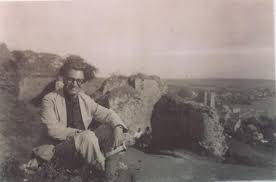A lost Sorabji masterpiece?
mainThe custodians of the legacy of Kaikhosru Shapurji Sorabji have informed us of what might be an important discovery of a long-lost work by a most unusual composer.
Toccata terza/Symphony for piano and orchestra
After almost sixty years in which the location of the manuscript of Sorabji’s 1955 Toccata terza has remained unknown (and accordingly described in the catalogue as “lost”), it has at last resurfaced in a private collection, along with a previously undocumented copy in the composer’s hand of the solo piano part from his orchestral symphony completed in 1922. Master copies of each are now in preparation and these two items will then be added to the Sorabji Archive catalogue.
This is the most important Sorabji manuscript discovery in many a year.
Toccata terza is cast in ten movements and, at 91 pages, is somewhat shorter than its 1934 predecessor Toccata seconda; Spanish pianist Abel Sánchez-Aguilera, who has performed and recorded Toccata seconda (the recording is due for release early next year), has already undertaken to typeset it and prepare it for performance.
More information is available on www.sorabji-archive.co.uk






Sorabji’s music may be uneven at times, but it is certainly inventive and never less than interesting. Looking forward to hearing these rediscoveries.
A pianist and scholar has already begun to make a typeset edition of this work and intends to perform – and hopefully also record – it thereafter. The piece is cast in ten movements and plays for around an hour and three quarters. Further information via sorabji.archive@gmail.com as well as from the website.
Wonderful news. Sorabji is not for everyone that’s for sure but I’ve been obsessed with him for over 20 years. I can’t wait for the premier recording.
Since ca. 1900, ‘unusual composers’ are no longer unusual.
A composer strictly for initiates. The only notable pianist that I have heard of who used to play his work was Michael Ponti.
Michael Ponti never played any of Sorabji’s music!
He might have had an interesting take.
Reminds me of an article in the New Yorker by- I think- someone (Alex Ross maybe?) who was sure he’d heard Toscanini conduct Tchaikovsky’s 5th, and on learning he never had, was still fairly sure was a Toscanini Tchaikovsky 5 would -sound- like (the article was, if memory serves, partially a meditation on “personality” in conducting/performing, etc. Described that way it sounds boring, which it wasn’t- though I’m not the author – if it was Ross’- most fanatic fan.) .. Anyhow.
By coincidence, I just finished listening to Opus Clavicembalisticum today (my second go-around in a decade). My impression is that about an hour of music in the four-hour work is extraordinarily fine. The rest strikes me as hopelessly overwritten — Ferruccio Messiaen on some cocktail of psychotropic drugs, so to speak.
I’ll be interested to read reviews of the recording of Toccata seconda when it’s released; perhaps Sorabji’s hyperpolyphony will be more tractable when presented with a variety of timbres.
I’ve sat through it and glad I did. More successful as an entity than Stevenson’s vaguely comparable, but shorter DSCH Variations.
The stumbling block are the fugues. They’re structurally necessary but they need to be heavily edited. They’re too neutral : bars stuffed with notes.
An interesting composer, in the sense that a crowded train station is interesting to a people-watcher, but most certainly not the genius that some make him out to be.
He wrote a few lovely and to some ears profound passages, but his works were stretched out to lengths beyond all reasonableness.
Let’s face it: he badly needed to self-edit, which he never brought himself to do.
“Toccata terza/Symphony for piano and orchestra…. is cast in ten movements”.
Oh please, spare me. KSS makes Mahler look like Webern.
But then again, he’s “the noted British iconoclast”, so I guess he gets a pass.
Agreed with all of this.
Another lost manuscript which I hope will be unearthed one day is Sir Peter Maxwell Davies’s orchestration of a portion of
Sorabji’s ‘Opus Clavicembilisticum’. I’d imagine this related to his friendship with fellow student John Ogden?
I’ve tried very hard to find this over many years but sadly to no avail!
I’d never heard of this orchestration, but I see it’s mentioned in Jones, Nicholas & McGregor, Richard (2010), “Peter Maxwell Davies’s Opus and WoO numbers: a new work list”, The Musical Times Vol. 151, No. 1910, p.57 -listed as WoO 41, mid-1950s estimated yes, arrangement of the first two movements for orchestra, J.41. (They also note that an updated version of the worklist is online which I see has moved since his death to “The Max Trust” site, and this information is confirmed at the worklist there, I see.)
I did not know, either, that Davies introduced Ogdon to the score (in 1956) (according to information provided by you to Craggs’ Maxwell Davies Source Book. That’s an interesting note…)
The first movement is already typeset and the edition of the whole is likely to be ready sometime next year. It is to be hoped that a recording will be made soon afterwards. The piece plays for around an hour and three quarters. Further information via sorabji.archive@gmail.com as well as from the website.
Sorabji, and masterpiece are two words never to be mentioned together in the same breath.
So says a boring file clerk…
The first movement is already typeset and the edition of the whole work is likely to be ready sometime next year. It is to be hoped that a recording will be made. The piece plays for around an hour and three quarters. Further information via sorabji.archive@gmail.com as well as from the website.
Victor Sangiorgio was a great player of Sorabji’s piano music
As far as I am aware he only ever played the composer’s early and attractive Fantaisie Espagnole.
If I may add, it was described as “lost” also because when Paul Rapoport wrote to inquire whether anything was known about it, Sorabji wrote him a letter (30 December 1974, duplicated in “Sorabji: A Critical Celebration”, page 101 and viewable in limited Google Preview) stating that the work was “destroyed soaked and ruined owing to the criminal stupidity and neglect” of the executors of the estate of the dedicatee, Clinton Gray-Fisk. Rapoport added in a footnote that some of Sorabji’s music that belonged to Gray-Fisk had been discovered in 1989, so there was the possibility it might turn up; and here we are. Not sure of the details offhand- maybe this one was sold off to a collector who took better care of it but unknown to the composer, before the rest of the collection was flooded (? again, not sure.)